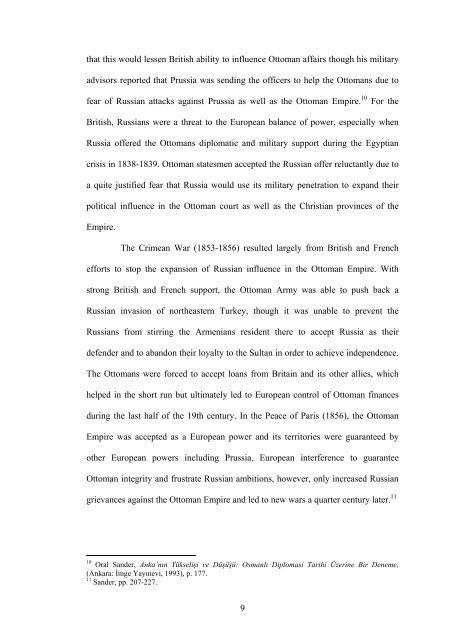the beginnings of ottoman-german partnership - Bilkent University
the beginnings of ottoman-german partnership - Bilkent University
the beginnings of ottoman-german partnership - Bilkent University
Create successful ePaper yourself
Turn your PDF publications into a flip-book with our unique Google optimized e-Paper software.
that this would lessen British ability to influence Ottoman affairs though his military<br />
advisors reported that Prussia was sending <strong>the</strong> <strong>of</strong>ficers to help <strong>the</strong> Ottomans due to<br />
fear <strong>of</strong> Russian attacks against Prussia as well as <strong>the</strong> Ottoman Empire. 10 For <strong>the</strong><br />
British, Russians were a threat to <strong>the</strong> European balance <strong>of</strong> power, especially when<br />
Russia <strong>of</strong>fered <strong>the</strong> Ottomans diplomatic and military support during <strong>the</strong> Egyptian<br />
crisis in 1838-1839. Ottoman statesmen accepted <strong>the</strong> Russian <strong>of</strong>fer reluctantly due to<br />
a quite justified fear that Russia would use its military penetration to expand <strong>the</strong>ir<br />
political influence in <strong>the</strong> Ottoman court as well as <strong>the</strong> Christian provinces <strong>of</strong> <strong>the</strong><br />
Empire.<br />
The Crimean War (1853-1856) resulted largely from British and French<br />
efforts to stop <strong>the</strong> expansion <strong>of</strong> Russian influence in <strong>the</strong> Ottoman Empire. With<br />
strong British and French support, <strong>the</strong> Ottoman Army was able to push back a<br />
Russian invasion <strong>of</strong> nor<strong>the</strong>astern Turkey, though it was unable to prevent <strong>the</strong><br />
Russians from stirring <strong>the</strong> Armenians resident <strong>the</strong>re to accept Russia as <strong>the</strong>ir<br />
defender and to abandon <strong>the</strong>ir loyalty to <strong>the</strong> Sultan in order to achieve independence.<br />
The Ottomans were forced to accept loans from Britain and its o<strong>the</strong>r allies, which<br />
helped in <strong>the</strong> short run but ultimately led to European control <strong>of</strong> Ottoman finances<br />
during <strong>the</strong> last half <strong>of</strong> <strong>the</strong> 19th century. In <strong>the</strong> Peace <strong>of</strong> Paris (1856), <strong>the</strong> Ottoman<br />
Empire was accepted as a European power and its territories were guaranteed by<br />
o<strong>the</strong>r European powers including Prussia. European interference to guarantee<br />
Ottoman integrity and frustrate Russian ambitions, however, only increased Russian<br />
grievances against <strong>the</strong> Ottoman Empire and led to new wars a quarter century later. 11<br />
10 Oral Sander, Anka’nın Yükselişi ve Düşüşü: Osmanlı Diplomasi Tarihi Üzerine Bir Deneme,<br />
(Ankara: İmge Yayınevi, 1993), p. 177.<br />
11 Sander, pp. 207-227.<br />
9
















